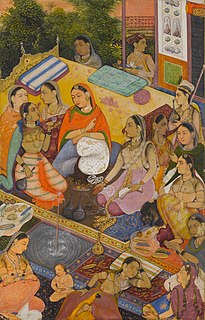 W
WWomen's history is the study of the role that women have played in history and the methods required to do so. It includes the study of the history of the growth of woman's rights throughout recorded history, personal achievement over a period of time, the examination of individual and groups of women of historical significance, and the effect that historical events have had on women. Inherent in the study of women's history is the belief that more traditional recordings of history have minimized or ignored the contributions of women to different fields and the effect that historical events had on women as a whole; in this respect, women's history is often a form of historical revisionism, seeking to challenge or expand the traditional historical consensus.
 W
WBelle Harris Bennett, led the struggle for and won laity rights for women in the Methodist Episcopal Church, South. She was the founding president of the Woman's Missionary Council of the Southern Methodist Church. Much of her work including fundraising and organizational efforts to provide higher education for a new professional class of social workers and community organizers in the Southern Methodist Church in the U.S. and abroad. Her carefully collaborative support for African Americans and immigrants was considered radical at that time by Southerners. She was a suffragist and supporter of temperance as well.
 W
WCariye or Cariyes was a title and term used for category of enslaved women concubines in the Islamic world of the Middle East. They are particularly known in history from the era of the Ottoman Empire, where they legally existed until the mid-19th century.
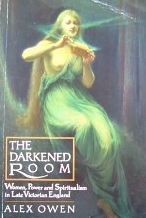 W
WThe Darkened Room: Women, Power and Spiritualism in Late Victorian England is a historical study into the role played by women in the Spiritualist religious movement in England during the latter part of the 19th century. It was written by the British historian Alex Owen and first published in 1989 by Virago, before being republished in 2004 by the University of Chicago Press.
 W
WDelphine is the first novel by Germaine de Staël, published in 1802. The book is written in epistolary form and examines the limits of women's freedom in an aristocratic society. Although de Staël denied political intent, the book was controversial enough for Napoleon to exile the author.
 W
WIsabella Ure Elder (1828–1905) was a Scottish philanthropist who took a particular interest in education, especially of women, and in the welfare of the people of Govan in Glasgow. In Govan alone, Elder was responsible for building Elder Park Library, a School for Domestic Economy, Cottage Hospital, the Cottage Nurses Training Home, and erecting a statue in honour of her husband John Elder. She also gifted Elder Park to the people of Govan. Many of her philanthropic works are still open to the community today.
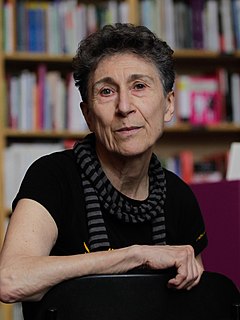 W
WSilvia Federici is an Italian and American scholar, teacher, and activist from the radical autonomist feminist Marxist and anarchist tradition. She is a professor emerita and Teaching Fellow at Hofstra University, where she was a social science professor. She worked as a teacher in Nigeria for many years, is also the co-founder of the Committee for Academic Freedom in Africa, and is a member of the Midnight Notes Collective.
 W
WElizabeth Ann Fox-Genovese was an American historian best known for her works on women and society in the Antebellum South. A Marxist early on in her career, she later converted to Roman Catholicism and became a primary voice of the conservative women's movement. She was awarded the National Humanities Medal in 2003.
 W
WConstantin Gane was a Romanian novelist, amateur historian, biographer and memoirist. Born into the boyar aristocracy of Western Moldavia, he worked as a lawyer in Bucharest, achieving literary notoriety with his recollections from the Second Balkan War and the Romanian front of World War I. By the 1930s, he was primarily a writer on historical and genealogical topics, famous for his contribution to women's history. An apologist for Romanian conservatism and Junimism, Gane also completed in 1936 a biography of Petre P. Carp. He was editor at Convorbiri Literare and a columnist for Cuvântul, also putting out his own magazine, Sânziana.
 W
WThe Glasgow Magdalene Institution was an asylum in Glasgow, Scotland, initially started in 1812 and was open until 1958.
 W
WGoddesses, Whores, Wives, and Slaves: Women in Classical Antiquity is a 1975 feminist history book by Sarah B. Pomeroy. The work covers the lives of women in antiquity from the Greek Dark Ages to the death of Constantine the Great. The book was one of the first English works on women's history in any period. It has been used as a textbook in many university-level courses on women in classical antiquity.
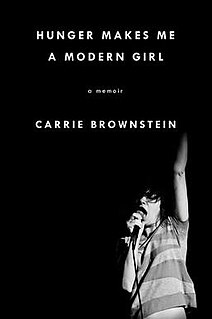 W
WHunger Makes Me a Modern Girl is a 2015 memoir by Carrie Brownstein, a bisexual guitarist and singer. Named for one of her lyrics, is about her life in and around music. The book starts with her as a hyper-performative young nerd who runs for vice president of her Washington State elementary school. The story goes on to cover Brownstein's escape from a turbulent family life into a world where music was the means toward self-invention, community, and rescue. Along the way, Brownstein chronicles the excitement and contradictions within the era’s flourishing and fiercely independent music subculture, including experiences that sowed the seeds for the observational satire of the popular television series Portlandia years later.
 W
WThe International Federation for Research in Women's History (IFRWH) is an international organisation whose aim is "to encourage and coordinate research in all aspects of women's history at international level...". It was founded in 1987. It is also known as the Fédération Internationale Pour la Recherche en Histoire des Femmes (FIRHF) and the International Federation for Promotion of Research into Women's and Gender History.
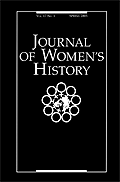 W
WThe Journal of Women's History is a quarterly peer-reviewed academic journal established in 1989 covering women's history. It explores multiple perspectives of feminism rather than promoting a single unifying form. Articles published in this journal showcase the dynamic international field of women’s history. The JWH features cutting-edge scholarship from around the globe in all historical periods. Publication in the JWH is a mark of scholarly distinction. It offers clear evidence of a scholar’s ability to ask and answer compelling questions of general interest. It is published by the Johns Hopkins University Press. The editors-in-chief from June 2020 are Sandie Holguín and Jennifer J. Davis.
 W
WDr Elspeth King is a Scottish curator, writer and social historian. She is known for her role as curator of social history at the People's Palace Museum in Glasgow, as Director the Stirling Smith Art Gallery and Museum, and for her scholarship on the Scottish Suffrage movement.
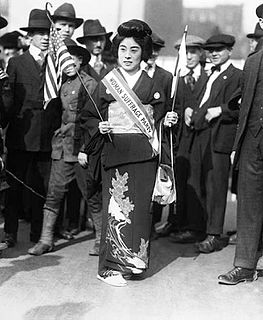 W
WKomako Kimura , also seen as Komaku Kimura or Komago Kimura in American newspapers, was a Japanese suffragist, actress, dancer, theater manager, and magazine editor before World War II. Her work, both literary and theatrical, shaped the women's rights and women's suffrage movement in Japan.
 W
WThe Ladies Rest Room is a historic building in Lewisburg, Tennessee, that is listed on the National Register of Historic Places.
 W
WA lavoir (wash-house) is a public place set aside for the washing of clothes. Communal washing places were common in Europe until industrial washing was introduced, and this process in turn was replaced by domestic washing machines and by launderettes. The English word is borrowed from the French language, which also uses the expression bassin public, "public basin".
 W
WGerda Hedwig Lerner was an Austrian-born American historian and woman's history author. In addition to her numerous scholarly publications, she wrote poetry, fiction, theatre pieces, screenplays, and an autobiography. She served as president of the Organization of American Historians from 1980 to 1981. In 1980, she was appointed Robinson Edwards Professor of History at the University of Wisconsin-Madison, where she taught until retiring in 1991.
 W
WIn human genetics, the Mitochondrial Eve is the matrilineal most recent common ancestor (MRCA) of all living humans. In other words, she is defined as the most recent woman from whom all living humans descend in an unbroken line purely through their mothers and through the mothers of those mothers, back until all lines converge on one woman.
 W
WEthel Agnes Mary Moorhead was a British suffragette and painter and was the first suffragette in Scotland to be forcibly-fed.
 W
WMursmäcka, also called bruksmäcka or only smäcka, was an historical profession for women in Sweden. A mursmäcka was a female construction worker with the task of handing mortar during construction work. The profession is recorded from at least 1691 and discontinued in 1922. This was a very hard but common job for a poor uneducated woman during the 19th century, particularly in Stockholm. In July 1888, the Mursmäcka of Stockholm performed a great strike action which attracted considerable attention in contemporary Sweden.
 W
WThe National Federation of Women Workers (NFWW) was a trade union in the United Kingdom active in the first part of the 20th century. Instrumental in winning women workers the right to a minimum wage for the first time, the NFWW broke down barriers for women's membership in trade unions in general.
 W
WBefore and during the colonial period of North America, Native American women had a role in society that contrasted with that of the settlers. Many women were leaders in Native American tribes. Cherokee women worked in treaty negotiations with the United States, and women in the Haudenosaunee confederacy acted, and continue to act, as political leaders and chose chiefs, for example. Other women were delegated the task of caring for children and preparing meals; their other roles varied between tribal groups. In many tribes, such as the Algonquins and Iroquois, women were responsible for tending to the fields while the men were responsible for hunting. There were often long periods in which the men were not present. Thus, women played a major role in the family and exerted significant control over social and economic factors within the tribes.
 W
WLinda Nochlin was an American art historian, Lila Acheson Wallace Professor Emerita of Modern Art at New York University Institute of Fine Arts, and writer. As a prominent feminist art historian, she became well known for her pioneering 1971 article "Why Have There Been No Great Women Artists?".
 W
WGriselda Frances Sinclair Pollock is an art historian and cultural analyst of international, postcolonial feminist studies in the visual arts and visual culture. Based in the United Kingdom, she is known for her theoretical and methodological innovation, combined with readings of historical and contemporary art, film and cultural theory. Since 1977, Pollock has been one of the most influential scholars of modern, avant-garde art, postmodern art, and contemporary art. She is a major influence in feminist theory, feminist art history and gender studies.
 W
WThe "Prison Special" was a train tour organized by suffragists who, as members of the Silent Sentinels and other demonstrations, had been jailed for picketing the White House in support of passage of the federal women's suffrage amendment. In February 1919, 26 members of the National Woman's Party boarded a chartered train they dubbed the "Democracy Limited" in Washington, D.C. They visited cities across the country where they spoke to large crowds about their experiences as political prisoners at Occoquan Workhouse, and were typically dressed in their prison uniforms. The tour, which concluded in March 1919, helped create support for the ratification effort that ended with the adoption of the Nineteenth Amendment on August 26, 1920.
 W
WPsychology's Feminist Voices (PFV) is an online, multimedia digital archive containing the stories of women of psychology's past and contemporary feminist psychologists who have shaped and continue to transform the discipline of psychology. It houses a wide range of materials, including original biographical profiles, oral history interview transcripts, video content, timelines, bibliographies, teaching resources, and an original 40-minute documentary on the emergence and current status of feminist psychology in the United States. The project is continually expanding and currently has a database containing the profiles of over 250 psychologists from around the world.
 W
WViolet Mary Craig Roberton, CBE (1888-1954) was a politician and local councillor, active in Glasgow, Scotland from 1921 - 1954.
 W
WRower woman was a female profession in Stockholm, Sweden, from the 15th century until the early 20th century. It consisted of women who ran a form of early water taxi; rowing people between the islands of Stockholm, to and from the islands of the Stockholm archipelago, as well as to and from places around Lake Mälaren on the other side of Stockholm.
 W
WGabriele von Shrenck-Notzing (1872-1953) was a German baroness and 20th century female aviator.
 W
WJoan Wallach Scott is an American historian of France with contributions in gender history. She is a professor emerita in the School of Social Science in the Institute for Advanced Study in Princeton, New Jersey. Scott is known for her work in feminist history and gender theory, engaging post-structural theory on these topics. Geographically, her work focuses primarily on France, and thematically she deals with how power works, the relation between language and experience, and the role and practice of historians. Her work grapples with theory’s application to historical and current events, focusing on how terms are defined and how positions and identities are articulated.
 W
WIn 1730 Thomas Coram approached aristocratic women with a petition to support the establishment of a Foundling Hospital, which he would present to King George II.
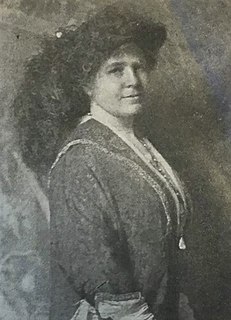 W
WElise Clay Bennett Smith, President of the Kentucky Equal Rights Association from 1915–1916, also served as an Executive Committee member for the National American Woman Suffrage Association. Her last name changed several times as she married three men in succession: from her birth surname of Bennett she became Smith, then Jefferson and finally Gagliardini.
 W
WThis is a timeline of women in aviation which describes many of the firsts and achievements of women as pilots and other roles in aviation. Women who are part of this list have piloted vehicles, including hot-air balloons, gliders, airplanes, dirigibles and helicopters. Some women have been instrumental in support roles. Others have made a name for themselves as parachutists and other forms of flight-related activities. This list encompasses women's achievements from around the globe.
 W
WThis is a timeline of women in photography tracing the major contributions women have made to both the development of photography and the outstanding photographs they have created over the 19th, 20th and 21st centuries.
 W
WLaurel Thatcher Ulrich is a Pulitzer Prize-winning American historian specializing in early America and the history of women, and a professor at Harvard University. Her approach to history has been described as a tribute to "the silent work of ordinary people"—an approach that, in her words, aims to "show the interconnection between public events and private experience." Ulrich has also been a MacArthur Genius Grant recipient. Her most famous book, “A Midwife’s Tale,” was later the basis for a PBS documentary film.
 W
WUnsung: A History of Women in American Music is a non-fiction book written by Christine Ammer about the subject of women in music and was first published in 1980 with a second edition published in 2001. The book covers approximately 200 years of American women's involvement in music. Unsung has become a "standard text" for the subject of American women in music.
 W
WThe Washington Women's History Consortium is a nonprofit organization that works to document, preserve, and disseminate historical information about the contributions and achievements of women within the state of Washington. The organization was established in 2005 by the state legislature and is managed by the Washington State Historical Society, supported by an advisory board that is appointed by the state governor and legislature. The Consortium is located at the Washington State Capital Museum and Outreach Center in Olympia.
 W
WWomen in Red is a WikiProject addressing the current gender bias in Wikipedia content. The project focuses on creating content regarding women's biographies, women's works, and women's issues.
 W
WThe Women's History of the World (ISBN 0-586-08886-5) is a book about women's history written by British author Rosalind Miles, first published in 1988. Later editions, including the paperback versions of the book, were titled Who Cooked The Last Supper: The Women's History of the World. The book examines the roles of women, their representation, and their power through history.
 W
WChildbirth and obstetrics in Classical Antiquity were studied by the physicians of ancient Greece and Rome. Their ideas and practices during this time endured in Western medicine for centuries and many themes are seen in modern women's health. Gynecology and obstetrics were originally studied and taught mainly by midwives in the ancient world, but eventually scholarly physicians of both sexes became involved as well. Obstetrics is traditionally defined as the surgical specialty dealing with the care of a woman and her offspring during pregnancy, childbirth and the puerperium (recovery). Gynecology involves the medical practices dealing with the health of women's reproductive organs and their breasts.
 W
WThe women's page of a newspaper was a section devoted to covering news assumed to be of interest to women. Women's pages started out in the 19th century as society pages and eventually morphed into features sections in the 1970s. Although denigrated during much of that period, they had a significant impact on journalism and in their communities.
 W
WThe Women's Peace Crusade was a grass-roots socialist movement that spread across Great Britain between 1916 and 1918. Its central aim was to spread a 'people's peace', which was defined as a negotiated end to the First World War without any annexations or indemnities. The movement was first established in Glasgow in July 1916, and officially launched on 10 June 1917. It later spread across Great Britain, with demonstrations taking place in Leeds, Bradford, Leicester, Birmingham and Lancashire. Although it gathered a substantial following, the Women's Peace Crusade faced opposition from both the government and police, with members being arrested and reportedly threatened.
 W
WYun Zhu or Wanglan Yun Zhu aka Adept of the Lotus Lake was a Qing dynasty poet, painter, anthologist and moralist. She gathered together thousands of poems written by hundreds of women.